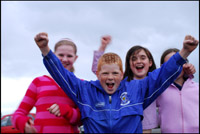Story by Nora Daly
Gaelic football is a game pumping with adrenaline and usually dripping with testosterone. Participants meet their opponents for the sheer love of intense competition, fame as individual athletes, and glory of their home team. No wonder the women of the Armagh Harps, the leading women's Gaelic football team in the area, are kicking, passing, and plucking the ball to glory. They are fighting for recognition in a field traditionally dominated by members of the rougher sex - as such, they are under a social microscope to push themselves, train harder, and drive faster. With an increasing number of fans at their side, the Harps are bringing recognition and machisma to this newly anointed women's sport. For the past year and a half the Harps have surfaced as a legitimate contender in the Gaelic world football spotlight. With the recent end to the troubles that plagued Northern Ireland, there has been a growing unity here, not only in the spirit of politics but in sports as well.
 "It takes a load of teamwork to do what we do," says Paula Powell, 27, a Harp midfielder, who has played for 14 years. "To step onto the field strong enough to win takes a lot of commitment and dedication from the players and trainers. Without them we would be nothing," Powell says.
Both Powell and Sinead Rafferty, 24, a full forward (a scoring position somewhat like point guard in basketball), describe their transition from the sidelines of a man's field to leading players in the fastest growing and most prominent women's team sport in Ireland. "We're a hard-working team," Sinead Rafferty says. "There's more acknowledgment [now] and more write-ups about our efforts."
A New Kind of Victory
The Harps' efforts certainly did not go unnoticed during their 37-9 semifinal victory over Tullysaran on a glowing evening in late July. Fans were captivated by the vibrant blue fabric-clad women, standing on the empty Sherry's Field in West Armagh. The Harps' signature uniforms reflect the energy gleaming from Paula's eyes as she speaks of the troubles women face in Irish sport.
"We're [still considered] second class athletes. That's just how it is," Powell said. "A man will always come first in this sport no matter how good we are or how long we've been a team."
With the demands of the field and the outside pressures to stay in step with the men's teams, training and dedication remain of utmost importance. For the Harps, a team composed of local wives, mothers, and single women, the goal is to establish a reputation in this predominantly male sport and to avoid being tarnished with classic stereotypes of female weakness and conservative manners.
Kicking Up Gaelic Tradition
 Because Gaelic football is so deeply rooted in Irish tradition, most fans treasure the sport for its primal and masculine displays of athleticism. These women demonstrate the most critical elements of endurance, physical resilience, and imperative game sense long reserved for men. Through passing, kicking, and explosions of speed their game is a whirlwind of activity and incredible motion, as the Harps soar past their opponents, stripping them of the ball and racing to an open goal. These very qualities, the sheer excellence of their play, certainly counteract the notion that Gaelic sportswomen are "second class" athletes.
County Armagh's senior male football players led their fans to a 2002 All-Ireland Championship along with countless regular season victories. With such great success and in an almost ripple effect, the Armagh Harps have also seen an incredible explosion of interest, particularly among younger generations. As Sinead Rafferty explains, "Now there are loads of youth. Right now our club has one hundred and ten girls with five teams, with age groups for the 16, 14, and under-12 age groups. We encourage all girls who want to play to give it a go."
Although the number of participants has grown drastically for the Harps, who were once a weary team of five but currently boast a healthy roster of twenty-seven, their time as a fully sponsored team has been short. "It has only been in the last two years that we haven't been paying for our equipment out of pocket," Paula explains. "We still encourage fundraising, but we don't stress it as much now that the club takes care of things more equally in planning tournaments and buying our sweats and such."
The Gaelic Athletic Association, the largest and most popular organization in Ireland, officially recognizes the Harps. But the newfound local recognition of the ladies who take part in Gaelic football is what truly solidifies the team - not only as individual athletes, but as a squad.
In a powerful display of strength and unmistakable talent, the Harps have transformed themselves from ordinary working women and mothers in town to impressive and commanding leaders on the open field. With an unwavering love for the game and the pride of joining such a remarkable team, the Harps are kicking up the notion of Gaelic football. Not merely creating a new and uniquely female style of Irish sport, they create a presence for the crowds that could challenge any male team.
Story by Nora Daly
Photos by Andrew Harrington
Video by Meg Carey
Web Design by Christine Slomski
|

